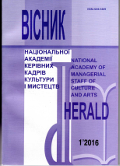V. VASILKO DIRECTOR'S INTERPRETATION OF G. KVITKA-OSNOVJANENKO’S PLAY "SHELMENKO-DENSCHIK"
DOI:
https://doi.org/10.32461/2226-3209.1.2016.138486Keywords:
Ukrainian theatre, a play, director and interpretation, actors, performance,Abstract
The article is devoted to the fate of the staged play "Shelmenko-denschik" by G. Kvitka-Osnovjanenko, its irectorialinterpretation and text translation, made in 1942, directed by. V. Vasilko, which in turn contributed to the Directorsof Kharkiv state academic drama theatre. Shevchenko theatre achieved with performances of the play ideological expressiveness,originality and originality of artistic images.
The researchers rightly argue that it is probably 1834 or 1835. As you know, the text of the comedy in five actswas first published in the printing house of Kharkiv University in 1840, and a year later, in abridged and edited form, inthe magazine "Pantheon of Russian and all European theatres". Publications consisted of tangible textual distinction,exclusion replicas of the characters and replacing them with others.
March 4, 1838 censor P. Korsakov transferred to the publisher Lysenkova I. T. the manuscript for printing. March 12 G. Kvitka-Osnovyanenko approached the publisher with a request to return the manuscript for revision. Korsakov, at the author‘s request, addressed to the St. Petersburg office of the theatres, which turned in hismanuscript for six months.
In Kharkiv theatre troupe of L. Matkovska began in November 1839 to stage the play. G. Kvitka-Osnovyanenkohad not left hope to undertake the publication of the play, therefore, appealed to the publisher at Kharkiv University andthe magazine "Pantheon of Russian and all European theatres", a version of which was sent censor of the manuscript,although a copy of the author modified and altered.
In 1841, at the Alexandrinsky theatre in St. Petersburg took place benesa performance "Shelmenko-Denschik",a famous Russian actor P. I. Grigorieva, and20 February 1842 she became benese in the performance of M. Schepkin at the Bolshoi theatre in Moscow.After 100 years V. Vasilko implemented a new staging of the play on the stage of drama theatre in Stalino, inthe genre of lyrical comedy, making Ukrainian translation of the text of the play and reinforced the satirical sound of thefinal (3rd) part of the use of Polonaise by M. Oginski.
At the beginning of the Second World War and in August 1941 the director implemented a new staging of theplay "Shelmenko-Denschik" where fourteen actors participated. He presented the new interpretation of the play as acomedy-satire and shortened the original for the performances in the front line.
In this regard, he has changed a biography of Shelmenko of a poor farmer, who were forcibly taken to the troops.At the end of March 1942 in the Voronezh on the stage of the city theatre it was resumed performances, and inthe comedy "Shelmenko-Denschik" the main role was played by the actor N. Pokotylo, which played Shelmenko in 999performances.
The play "Shelmenko-Denschik" in away version they played for the soldiers at the front, for example, Bukrynskyybridgehead, military units that were formed in the rear, and excerpts – played the front-line team, for example, in1943-m the Ukrainian front.In the postwar years, the performance of "Shelmenko- Denschik" in the staging of V. Basilica remained in therepertoire of Kharkiv state academic drama theatre. T. G. Shevchenko.For many years, whole generations of Ukrainian filmmakers turned to the immortal comedy "Shelmenkodenschik"by G. Kvitka-Osnovjanenko, however, only V. Vasilko managed to create a performance that more than70 years remains in the repertoire of one of the leading Ukrainian theatres.
Downloads
Published
Issue
Section
License
Authors who publish with this journal agree to the following terms:
1. Authors retain copyright and grant the journal right of first publication with the work simultaneously licensed under a Creative Commons Attribution License International CC-BY that allows others to share the work with an acknowledgement of the work's authorship and initial publication in this journal.
2. Authors are able to enter into separate, additional contractual arrangements for the non-exclusive distribution of the journal's published version of the work (e.g., post it to an institutional repository or publish it in a book), with an acknowledgement of its initial publication in this journal.
3. Authors are permitted and encouraged to post their work online (e.g., in institutional repositories or on their website) prior to and during the submission process, as it can lead to productive exchanges, as well as earlier and greater citation of published work (See The Effect of Open Access).


